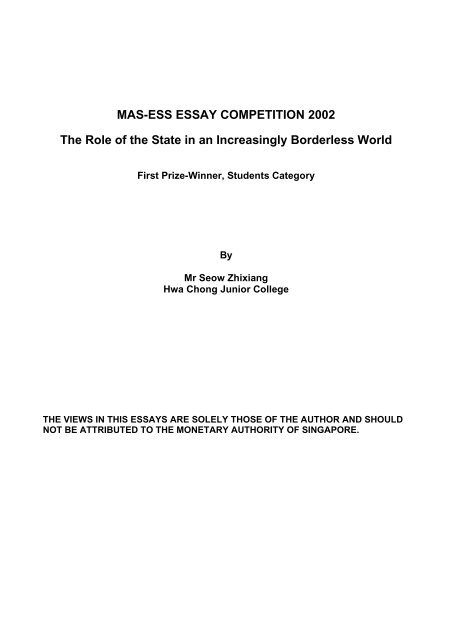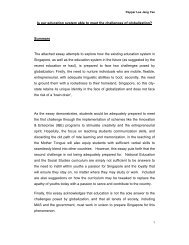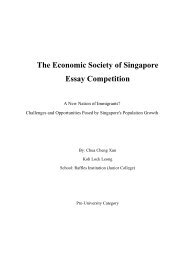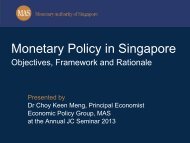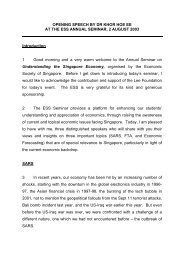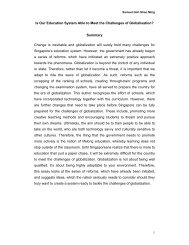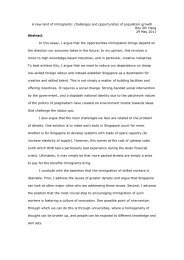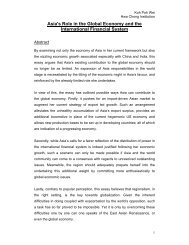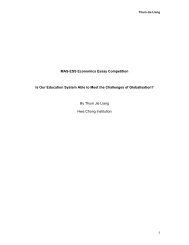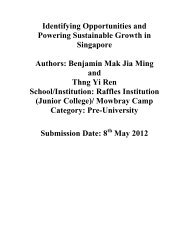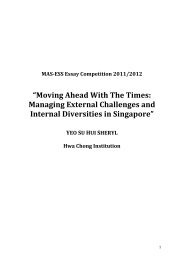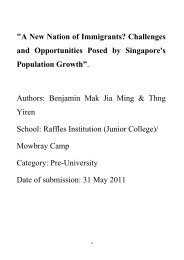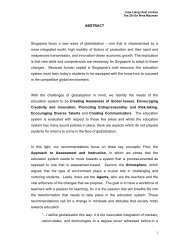First Prize Essay - Economic Society of Singapore
First Prize Essay - Economic Society of Singapore
First Prize Essay - Economic Society of Singapore
Create successful ePaper yourself
Turn your PDF publications into a flip-book with our unique Google optimized e-Paper software.
MAS-ESS ESSAY COMPETITION 2002The Role <strong>of</strong> the State in an Increasingly Borderless World<strong>First</strong> <strong>Prize</strong>-Winner, Students CategoryByMr Seow ZhixiangHwa Chong Junior CollegeTHE VIEWS IN THIS ESSAYS ARE SOLELY THOSE OF THE AUTHOR AND SHOULDNOT BE ATTRIBUTED TO THE MONETARY AUTHORITY OF SINGAPORE.
2SynopsisGovernments have always played a dominant role in the development <strong>of</strong> a country’seconomy. However, as the world increasingly comes to resemble a single integratedmarket, with paradigms that are markedly different from what has come to be known as theOld Economy, the manner and level <strong>of</strong> government involvement needs to be re-evaluated.This essay first <strong>of</strong> all outlines the parameters <strong>of</strong> the new global economy, how these differfrom the old economic model and the potential benefits and setbacks in embracing thenew model. It would look at how this would affect policymakers as they seek to harnessthe global economy while safeguarding their constituents from its worst excesses. Itexamines the necessary creation <strong>of</strong> new roles, the redefinition <strong>of</strong> old roles, thedecentralisation <strong>of</strong> decision-making power to market agencies, and the problems countrieswill face in creating a globalised, knowledge-based economy. Changes to social structuresand priorities will also be explored. Finally it stresses the necessity <strong>of</strong> international cooperationand consensus building in order for the fruits <strong>of</strong> globalisation to be moreequitably distributed.
4The advent <strong>of</strong> multinational corporations with interests spanning the globe has made thereversion to isolationism extremely costly. ICT <strong>of</strong>fers governments an unprecedentedopportunity to streamline bureaucracies, to eliminate red tape, and to better understandthe circumstances <strong>of</strong> their countries and constituents.Expectations <strong>of</strong> the quality <strong>of</strong> governance will rise. With a better understanding <strong>of</strong> globalsituations at the grassroots level, there will be an inevitable comparison between local andforeign conditions. Price and wage differentials will become immediately obvious.Governments who cannot meet citizens’ aspirations will find themselves looking at anexodus <strong>of</strong> talent from their countries, or facing social unrest.The economics <strong>of</strong> growth have been altered. Technology has improved the efficiency <strong>of</strong>agriculture and manufacturing. However, as markets for primary and low-end secondaryproducts become fully exploited, this would also mean that these sectors would beshedding employees. 1In the global economy, the greatest pr<strong>of</strong>it is derived fromknowledge—knowledge <strong>of</strong> consumers’ needs, <strong>of</strong> how to fulfil those needs, and fulfillingthem better and more cheaply than your competitors.Globalisation is more than an economic phenomenon. The shrinking <strong>of</strong> the world hasmagnified problems like environmental degradation and the rich-poor divide. Countries1 This is true even for tertiary sector products. In an article from its August 10 th issue this year, commentingon the lacklustre performance <strong>of</strong> AOL Time Warner (New boss, same problems), The Economist quotedPeter Kriesky <strong>of</strong> Kriesky Media Consultancy as saying, “When your market has begun to mature (referring toAOL’s one-size-fits-all dialup service), you need to segment the market and develop a family <strong>of</strong> must-haveservices targeted to different customer groups.”
5face ever-increasing intrusions on sovereignty, either through the expanded areas <strong>of</strong>jurisdiction <strong>of</strong> international bodies like the World Trade Organisation or the surrender <strong>of</strong>prerogatives to associations like the European Union. The ability <strong>of</strong> governments toinfluence the operation <strong>of</strong> economies is also diminished by the increased clout <strong>of</strong> MNCs,whose interests are not aligned with any particular state.THE NEW ROLE OF THE STATEAmong all the uncertainties <strong>of</strong> the new economic paradigm, the permanence <strong>of</strong> economicneeds remains constant. This must be the utmost consideration as policymakers seek tomeet the challenges <strong>of</strong> globalisation. Policymakers should not be encumbered byexpectations placed on them to conform to a set <strong>of</strong> “acceptable” policies, and shouldcontinue to be guided by realpolitik dictates in policy formulation.Countries should integrate with the world market in a manner and extent that is compatiblewith their state <strong>of</strong> development. There is no shame in erecting trade barriers when aneconomy is mostly made up <strong>of</strong> fledging industries. There is no sense in investing vastsums on so-called New Economy projects when a country lacks the requisite human andphysical capital, and when a country’s comparative advantages obviously lie in otherareas, like Malaysia and that country’s sputtering Multimedia Super Corridor. This is not todeny the many advantages <strong>of</strong> globalisation, but to make a case for understanding boththese advantages and a country’s economic disposition, and for flexibility in the pace andmanner <strong>of</strong> integration. Governments should retain powers <strong>of</strong> safeguard, to be able tointervene swiftly and effectively in event <strong>of</strong> market failures. Dr. Mahathir’s unorthodox
6response to the threat <strong>of</strong> a capital exodus—currency controls—has arguably savedMalaysia’s fledging financial markets and its economy from being laid waste by Mr. Sorosand his associates.Governments are instituted to insure the well being <strong>of</strong> the governed, <strong>of</strong> which economicwelfare is only a part. Although developments, discussed below, may have diminished theconflict <strong>of</strong> interest between pr<strong>of</strong>it and social priorities, it is still hard to balance the two, andgovernments must remain committed to finding an optimal combination.Legislation and RegulationCapitalist economies are founded on the rule <strong>of</strong> law and the enforceability <strong>of</strong> contracts.Regulation has always been a key function <strong>of</strong> government. In the past, enforcement waseasily undertaken—good and services traded were clearly defined, the opportunities forfraud and malpractice were foreseeable. However, the goods and services traded todayare not as tangible, and the complexity <strong>of</strong> market operations lends itself to abuse, like theanalysts in America who wilfully led their clients to invest in failing stocks. This situationexists in part due to an asymmetry <strong>of</strong> knowledge. Information is cheap and widelyavailable, but not all people can make sense out <strong>of</strong> it—it will take even experts manymonths to unravel the accounting antics <strong>of</strong> Enron. It is <strong>of</strong>ten in the interest <strong>of</strong>knowledgeable parties to withhold this knowledge, because an edge in knowledge <strong>of</strong>tentranslates into pr<strong>of</strong>it. Recently a letter was written to The Straits Times protesting thedisclosure <strong>of</strong> customer databases by <strong>Singapore</strong> Power to third parties for commercial
7purposes, a grave violation <strong>of</strong> consumer privacy. Internet phenomena like mp3.comcompromise the integrity <strong>of</strong> trademarks and copyrights.A reform <strong>of</strong> old regulatory regimes is in order. However, in their anxiety to punish,governments may run a risk <strong>of</strong> over-regulation. Already there are concerns that thelegislation and lawsuits slapped on post-Enron capital markets is suppressing one <strong>of</strong>America’s greatest competitive advantages. Applied carefully, regulation preventsmalpractice. Applied excessively, it stifles business sentiments. Perhaps governmentsshould keep in mind that the erosion <strong>of</strong> confidence generated by their own folly is thegreatest punishment that errant businesses can receive. Governments should outlawspecific detrimental practices and not institute well meaning blanket legislation thatburdens commerce with arbitrary restrictions. They should also understand that marketdevelopments <strong>of</strong>ten outpace policy formulation, and that a constant review and renewal <strong>of</strong>legislation is necessary for its relevance.As consumers become better educated and in a better position to make informeddecisions, governments should encourage them to rely less on state protection but toexercise the old market maxim <strong>of</strong> caveat emptor—buyer beware. As voluntary andinformed participants in a legal, buyer-willing-seller-willing transaction, buyers can andshould be expected to be fully cognisant <strong>of</strong> the risks involved in their purchases.Besides the need to safeguard consumers’ interests, there is also a need to provide a legalframework for the development <strong>of</strong> New Economy businesses. The validity <strong>of</strong> electronic
8contracts and mechanisms for their enforceability has not been addressed by manylegislatures, despite the increased popularity <strong>of</strong> electronic commerce. The authenticity <strong>of</strong>contracting parties <strong>of</strong>ten cannot be verified. Countries who fail to clarify the legal positions<strong>of</strong> new businesses that fall outside <strong>of</strong> conventional definitions will be left out in theexploitation <strong>of</strong> new niches.The Enron and WorldCom accounting scandals provide ample evidence <strong>of</strong> the fallibility <strong>of</strong>even the most transparent and vigilant regulators in the world. The changing world willcontinually test the integrity and adaptability <strong>of</strong> established institutions. Corruption andabuse continue to be rampant in countries like China, where civil servants are underpaidand government watchdogs are either toothless or themselves partners in crime.Governments must exercise zero tolerance <strong>of</strong> corruption and incompetence, and upholdtransparency and legality. Only then can investor and consumer confidence be sustained.<strong>Economic</strong> RoleAs mentioned earlier, the dominant source <strong>of</strong> growth in the global economy will come fromthe ability to innovate, to create niche markets and enrich existing ones. The challenges foreconomic policy in the global economy would be to ensure a smooth transition from anagricultural and manufacturing centred model to a knowledge-based economy, to secureinvestment and to ensure flexibility and resilience in the face <strong>of</strong> increased volatility.Even with the best <strong>of</strong> economic and political climates, the creation <strong>of</strong> a knowledge-basedeconomy will be fraught with difficulties. A developing country’s education policy is usually
9oriented towards producing engineers, technicians and other production line relatedexpertise. A dearth <strong>of</strong> managerial and operational expertise is likely to limitcompetitiveness. Developing economies are characterised by a predominance <strong>of</strong> largefirms reaping significant economies <strong>of</strong> scale, with a negligible Small and MediumEnterprise presence. Firms like South Korea’s chaebols and Japanese conglomerates arenotoriously inert and reliant on “winning formulas” concocted decades ago. Protected bypork barrel politics and domestic barriers to entry, these firms have no incentive tospearhead the innovation that is crucial to a knowledge-intensive economy. Theexploration <strong>of</strong> niches is a long and not necessarily fruitful process, as the bursting <strong>of</strong> thedotcom bubble evidenced. While a country seeks to define its areas <strong>of</strong> competitiveadvantages, structural and frictional unemployment can derail progress.The government’s role as investor-in-chief remains important. As in the Old Economy,governments are more able to undertake riskier, costlier ventures where returns are notimmediate—the <strong>Singapore</strong> government has invested upwards <strong>of</strong> US$700 million intodeveloping a biotechnology sector 2 as our competitive edge in manufacturing is whittledaway by Chinese competition. In the absence <strong>of</strong> protective barriers, governmentinvestment has become a formidable tool to ensure domestic competitiveness againstinternational corporations. The onus is on countries with large public sectors to ensure thatthose companies are subjected to market rigours, that management is competent, and thatcontinual processes <strong>of</strong> consolidation and rationalisation are in place. Businesses not2 Asia Private Equity Review, June 2000
10relevant to strategic needs or the development <strong>of</strong> domestic niches and competitivenessshould be privatised.Knowledge has replaced mass production as the basis <strong>of</strong> wealth creation. Governmentshave to pay especial attention to how innovation happens, and make sure it does. Oneway to do this is through patent policy. If firms can expect to pr<strong>of</strong>it from a legalisedmonopoly <strong>of</strong> breakthrough technology or through licensing their innovations, then they aremore likely to come up with new ideas. Countries where intellectual property rights arepoorly enforced, like China, are unlikely to attract knowledge-driven, high value-addedindustries. On the other hand, the dissemination <strong>of</strong> new technology benefits society atlarge, contributes to economic and non-economic welfare and inspires further innovation.Governments must reconcile the conflict <strong>of</strong> interest between facilitating innovation andspreading its benefits.Tied to the need to innovate is the need to create a comprehensive and dynamic educationsystem. Demanding East Asian education systems have churned out thousands <strong>of</strong>technicians that helped their countries complete their industrialisation drive and surgeahead <strong>of</strong> resource-rich but human capital-poor countries like Brazil. Now the challenge forthese countries is to encourage entrepreneurial spirit and innovation in risk adversepopulations. A greater emphasis on social sciences and the humanities would provide amore diverse talent pool. Employers should recognise that sending employees for skillsupgrading would bear dividends and be given incentives for doing so. The workforceshould understand that upgrading increases its employability in the face <strong>of</strong> the ever-
11diminishing shelf lives <strong>of</strong> skills and products. Education systems should take note <strong>of</strong> thediffusion <strong>of</strong> knowledge between once-demarcated disciplines—Wall Street financiersemploy physicists to conjure up the financial instruments and investment strategies thathas made New York a world financial hub.The greatest dynamism in the global economy will come from small firms, with their greatersensitivity to market fluctuations. Having no market muscle they are reliant on anticipatingfuture demand, and in areas like s<strong>of</strong>tware development they <strong>of</strong>ten lead larger firms infulfilling specialised needs. With their informal work cultures they are more flexible thantheir larger counterparts and are <strong>of</strong>ten the first to rebound from recession. Governmentsshould recognise the role small firms play in identifying demand patterns, erodingmonopolistic dominance, and galvanising large firms to undertake their own R&D to catchup. Stringent bankruptcy laws should be eased to reduce the cost <strong>of</strong> failure. Banks shouldbe encouraged to extend credit to small businesses without the ability to provide collateral.Given their comparatively small turnover, governments lose little in taxing them lightly.Complicated bureaucratic processes should be streamlined—perhaps rules <strong>of</strong> thumb likenot more than three forms to start a company can be adopted. In their efforts to promotehomegrown companies with international stature governments must bear in mind thatproviding opportunities for SMEs to flourish makes for more balanced growth and greateroverall resilience.Governments should realise, in their efforts to make countries more attractive to investors,that they should not only be concerned with the sheer volume <strong>of</strong> investment but also the
12nature <strong>of</strong> investment. As barriers to the movement <strong>of</strong> capital are removed, countries shouldnot be surprised that they are losing cost advantages driven investment to markets likeChina, which received US$40 billion in foreign direct investment in 2000 3 alone. Rather,governments should be concerned about the amount <strong>of</strong> investment received in a country’sareas <strong>of</strong> competitive advantages. This would be a crucial indicator <strong>of</strong> a country’s ability todifferentiate itself. Silicon Valley, the cradle <strong>of</strong> the information technology revolution,received US$21 billion in venture capital investment in 2000, despite sky-high operationalcosts. Even after the demise <strong>of</strong> the dotcom bubble, investors still ploughed in US$6 billion,hoping to be in position to ride the next boom 4 .As barriers to mobility break down, as employment becomes international in nature, theexodus or the influx <strong>of</strong> talent has become a top policy concern. On the surface thescramble for foreign talent seems like a zero sum game. Yet governments cannot take anysignificant, explicit action to insure countries against a brain drain. Perhaps a newperspective on this thorny issue is in order. People are attracted to opportunity. When acountry is not receiving its fair share <strong>of</strong> talented immigrants, it needs to ask itself: do itspeople lack opportunity at home? Many Japanese find this to be the case. However, evennet exporters <strong>of</strong> talent need not be dismayed—foreign enclaves <strong>of</strong> your own people arebeachheads for further investment and expansion in that country. The Jewish and Indiandiasporas are examples <strong>of</strong> communities that remain strongly attached to their homelandafter generations in a foreign land.3 Newsweek, September 3, 2001 The Spread <strong>of</strong> China Inc.4 BBC, January 25, 2002 Hope lives on in Silicon Valley
13Social PolicyThe effects <strong>of</strong> globalisation are not restricted to the economy. As businesses and societygear up to meet the challenges <strong>of</strong> a fast-paced world, traditional values and lifestyles comeunder siege. Negative externalities generated by industries are felt more acutely aspopulation densities soar. There is no simple approach to the complex challenges posed tosociety by globalisation.Social structures and priorities are undergoing a transformation. The nuclear family’scohesiveness has been eroded by the high incidence <strong>of</strong> two working parents. Income gulfshave widened, sometimes coinciding with racial divides. Instead <strong>of</strong> a hierarchy based oncaste or race, a social order founded on merit is emerging. An increasing competitive andcommercialised society is in danger <strong>of</strong> leaving behind the disadvantaged and forgettingsuch intangibles like the arts and graciousness. Governments can increase job securityand benefits for part-time workers, who are <strong>of</strong>ten parents who work and take care <strong>of</strong> theirfamilies, or giving grants to budding artists. Subsidising basic education, healthcare, andhousing, levels the playing field and ensures an equality <strong>of</strong> opportunity. Most importantly,governments will send a strong signal that a nation is defined more by these intangiblesthan by its economic prowess.The global reach <strong>of</strong> businesses has exacerbated the problems they generate. Encouragingconsumer activism can complement the regulatory function <strong>of</strong> government in combatingthese problems. By working with interest groups, and through the ubiquitous mass media,governments can benchmark firms according to compliance with labour statutes, levels <strong>of</strong>
14pollutant emissions, efficient energy usage and raise awareness <strong>of</strong> the relevance <strong>of</strong> theseindicators. Consumers can then actively discriminate between firms that adopt bestpractices and those that do not. There is therefore a dual pressure from regulatory bodiesand market forces that would compel firms to update their production processes to adhereto environmental and social standards. Governments need to stress that the goals <strong>of</strong>pr<strong>of</strong>itability and social responsibility are not exclusive—efficiency boosts pr<strong>of</strong>its, investmentin education and respect for labour rights boosts productivity and motivation,environmental responsibility enhances public image. In combating old problems likeunemployment, governments must mix compassion and discipline—retraining criteria mustgo hand in hand with providing unemployment benefits. As fish become more elusive,people must be taught how to fish.International RelationsThe world has become so organically linked that countries ignore their neighbours’ woes attheir own peril. The EU’s new eastern frontier is threatened by crime and poverty inUkraine, Belarus and Moldova. September 11 showed how threats to our commonsecurity, working through increasingly porous societies, have also become globalised. In1999 <strong>of</strong>ficial development assistance to developing countries stood at US$5.6 billion, apaltry 0.24% <strong>of</strong> the net GDP <strong>of</strong> the principal donors 5 . Developed countries need to be moregenerous in forgiving debt, transferring know-how and removing barriers to Third Worldexports. Consensus and co-operation between nations, along with the integrative effects <strong>of</strong>5 World Trade Organisation, <strong>Economic</strong> Research and Analysis Division—Globalisation Statistics 2001
15globalisation, will lay the foundation for a more equitable world, principled and prosperous,free from want and fear.ConclusionIt would seem, therefore, that the explicit and implied responsibilities <strong>of</strong> governments havenot diminished in a globalised world. Rather, they have changed in nature, from economicdirection to regulator, from leader to partner. Governments must embrace their new roleswith vigour and alacrity, for although it cannot be said if things would get better if wechange, we must change if things are to get better.


